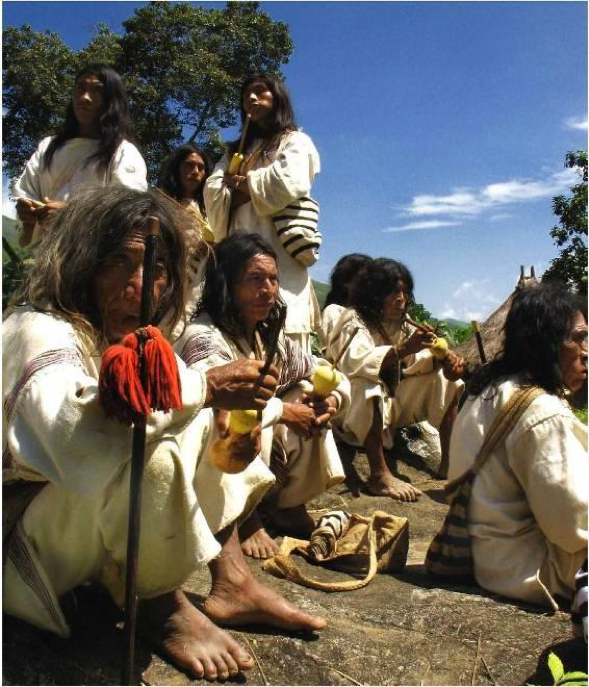First published on 01/10/2014, and last updated on 03/10/2018
By Guillermo E. Rodriguez-Navarro, Fundación Pro-Sierra Nevada de Santa Marta (Honorary member)
The Constitution of 1991 has given to indigenous peoples in Colombia a measure of autonomy in the management of their land and recognition of the value of indigenous knowledge for that management, and the recovery of some of the forests and sacred lands. The construction of new indigenous villages in the indigenous reservation borders with support of the national government – a project called the Cultural and Environmental Belt – has increased the indigenous peoples’ presence in the lower parts of the Sierra Nevada de Santa Marta. This is one of the strategies to preserve this cultural landscape, but the threat remains of losing access to some of the culturally important places. In addition, there are continued displacements of population to lower places of the Sierra, where contact with Western culture is stronger and tends to result in various degrees of acculturation. The ability of indigenous societies to exercise self-governance and independence is of crucial importance, especially since the national parks in which their territories lie are ‘paper parks’, not actually protected and preserved.
It is worth noting, nevertheless, that the Ministry of Environment and the Special Administrative Unit of National Natural Parks consider the ancestral traditional management of the indigenous groups of the Sierra Nevada to be a conservation tool that guarantees the maintenance of the ecosystem and its biodiversity. Agreements are under way to build adequate governance mechanisms that will ensure indigenous autonomy.
The Cabildo Gobernador head of the Indigenous Organization Gonawindua Tairona, Jose de los Santos Zauna Alimaku, has been invited to become an Honorary member of the ICCA Consortium. This is an important link and support to show how traditional governance systems are able to take and implement decisions that result in the conservation of nature and natural resources. Today, however, such traditional governance systems face a variety of external and internal threats including when dealing with the environmental authorities and protected areas.
Extractive industries are ominously interested in the mineral, oil and gas resources found within the ICCAs of the Sierra Nevada de Santa Marta. To get at those resources, industries are more than ready to sacrifice the biological and cultural diversity there and harm their people. Weak governments, weak collective rights to the territories and natural resources, and government-imposed protected areas contribute to such pressures and add to the threats faced both by the indigenous groups and the ecological system of the Sierra Nevada. The indigenous groups of the Sierra Nevada de Santa Marta, however, have a Consejo Territorial de Cabildos that gathers all indigenous groups of the Sierra and is in the process of negotiating indigenous governance of traditional territories, including the management of Protected Areas.
 The time has come for our industrialized and secularized society to learn from these indigenous societies, incorporate their moral values, and envelop an ecological understanding in social action and economic behavior. This knowledge must come to form part of a new mode of life that post-modern man will need to develop if he is going to have any chance to effectively protect the basic resources that assure the survival of life on the planet. The spiritual significance of the cultural landscapes fashioned by the indigenous peoples of the Sierra Nevada de Santa Marta is being destroyed, and if it is not preserved, it may be lost to us forever. Only through a better understanding of natural processes and cycles and increased awareness of the detrimental effect that our ‘toys’ (as the indigenous groups call our technological devices) have on the environment, can we aspire to recover the meaning of our territories and the sense they give to life.
The time has come for our industrialized and secularized society to learn from these indigenous societies, incorporate their moral values, and envelop an ecological understanding in social action and economic behavior. This knowledge must come to form part of a new mode of life that post-modern man will need to develop if he is going to have any chance to effectively protect the basic resources that assure the survival of life on the planet. The spiritual significance of the cultural landscapes fashioned by the indigenous peoples of the Sierra Nevada de Santa Marta is being destroyed, and if it is not preserved, it may be lost to us forever. Only through a better understanding of natural processes and cycles and increased awareness of the detrimental effect that our ‘toys’ (as the indigenous groups call our technological devices) have on the environment, can we aspire to recover the meaning of our territories and the sense they give to life.
